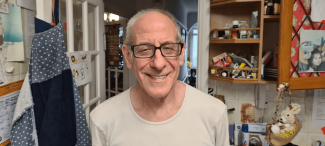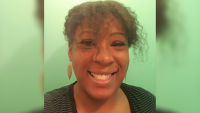Go for what you want

Retired doctor David Goldmeier shares his story of living with a stammer, from finding things difficult at school to looking forward to giving lectures.
I'm David and I am a 73-year-old retired doctor. Severe Covid in April 2020 and the resulting anxiety and depression forced retirement on me.
I am telling you what you already know — that we stammerers find certain situations difficult, like saying our name and talking on the phone. I recall when I was about 6 and at school. In those days we had to say our name in the morning to register our attendance. It seemed to me that three girls in the class delighted in my efforts to bring the words out, laughing and cackling at me.
Later on at school I was able to act in plays speaking fluently. My take on why this should be is that speaking words is the end result of the initial action of marshalling one's thoughts. Then, converting these thoughts into words and finally enunciating them. As an actor I only needed to voice the words. As I say, that's my theory.
By the time I reached grammar school, anticipatory anxiety relating to speech had ratcheted up a few notches. I used the words "you know" as a lead into whatever I was going to say. I often repeated it many times, finally blocking on the attempted start to the sentence. Some teachers would reply "But I don't know". That made me feel angry and embarrassed. Remember, this was the late 1950s and early 1960s. The teachers knew perfectly well I had a stammer. This was bullying.
Our headteacher was respected by staff and pupils alike. He was concerned about my stammer and sent me to a local speech therapist. I can't recall what she did but whatever it was it did not help.
Medical School
However, at the same time I had a burning aspiration to study medicine. By the time I was interviewed for medical school I had found out for myself that exercise and drinking some tea before a set piece speaking event would help my fluency. Medical school, particularly presenting cases to consultants, was torture. Being prepared and knowing the details did help.
About this time I met my wife. In our family, the 'Hamlet cigars' event is recalled with kind humour. I was in a shop asking for a pack of Hamlet cigars (I have not smoked for 53 years) and couldn't get the words out. My wife just collapsed in laughter but said she loved me just the same. My wife's sister told me she had never met someone who stammers before and had the idea that we were all rather intellectually stupid! Of course, we know that's not the case.
From about the age of 50 to 70, I almost looked forward to giving talks — I realised that people wanted to hear me for what I was saying and for my expertise rather than coming to hear my diction.
I have always wondered what life would be like without a stammer. I think I'd possibly have been much more in demand as a lecturer, but I may have been a less sympathetic and empathic doctor.
I have tried a number of therapies to try to minimise what I consider to be my speech problem — these include personal construct therapy (which I found a waste of time) and delayed auditory feedback of my voice using a device, which was useful for a time.
Growing in confidence
As I grew older, I became more confident in myself and in what I did. I found that if I prepared my lectures well, and as I said, exercised and had strong tea pre-lecture, my stammer was hardly noticeable. From about the age of 50 to 70, I almost looked forward to giving talks — I realised that people wanted to hear me for what I was saying and for my expertise rather than coming to hear my diction. Giving the talks was rather like acting in a set piece play and I was in the role of 'the knowledgeable one'.
My advice to anyone who stammers is to go for what you want and not let worries about stammering get in the way. I found that things get better with the years. That said, it can be a heavy burden in one's formative years and one needs strength and support to reach goals.
Please note that what some people don't find helpful, others do, so take a look at our One-to-one Adult Speech & Language Therapy and Adult Stammering Courses for all the different types of support available for stammering. See our Apps & Devices page for information about delayed auditory feedback resources.

































